“We Grow Older Together.” The Journey of Parent Caregivers
The story was co-published with Black Voice News as part of the 2024 Ethnic Media Collaborative, Healing California.
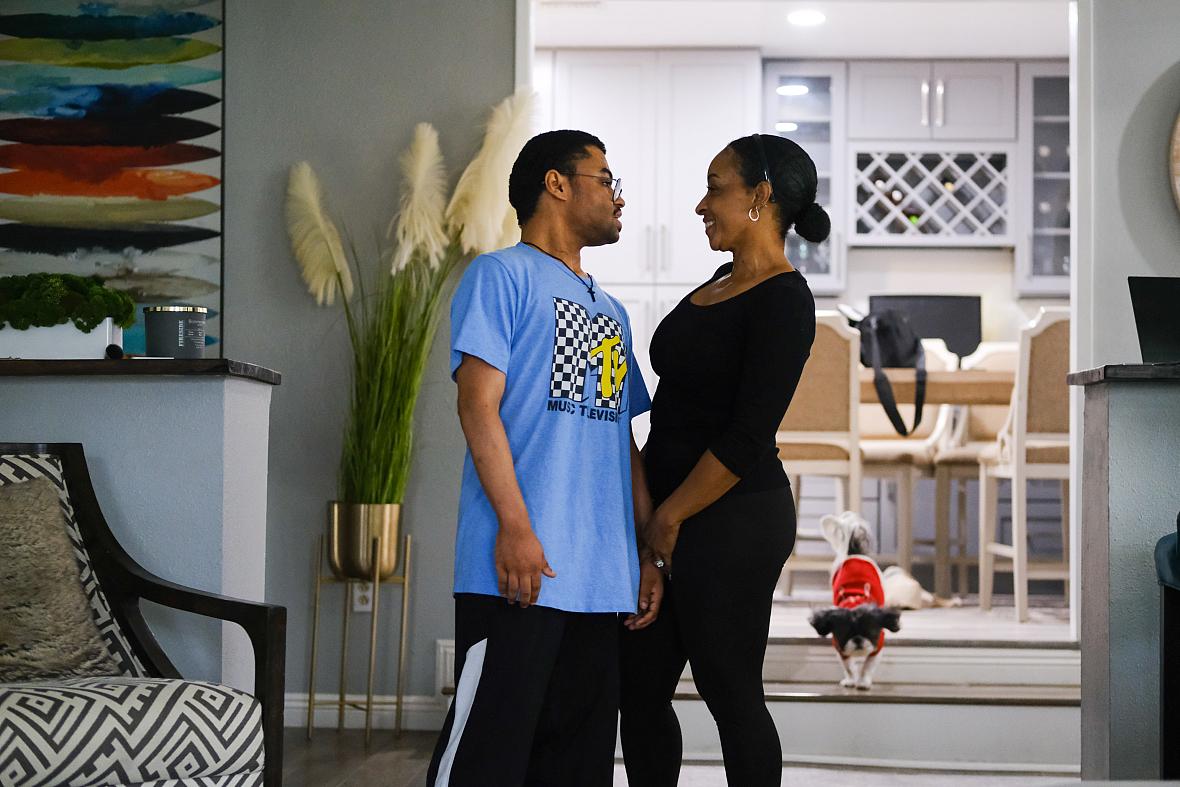
Crystal Foster and her son Tyler Foster, 28, pose for a portrait in their home in Corona, California on October 16, 2024. Crystal says the most rewarding part of caregiving has been seeing how far Tyler has come and to know that she has learned a lot. “The fact that we've made it through the worst times of his life, and I did a good job,” she affirmed.
(Aryana Noroozi for Black Voice News/ CatchLight Local)
At age 25, Crystal Foster, now 52, gave birth to her son, Tyler Foster, in a traumatic pregnancy. Tyler, who has cerebral palsy and developmental delay, did not come home from the hospital until he was a year old. For eight years, Tyler was very ill and required a ventilator among other machines. Nurses would come to the Foster’s home for 16 hours a day to care for Tyler and then his parents were left to take over their duties for the remainder of the day.
During that time, Crystal said she was on autopilot and lived in a state of panic. Although she trusted the nurse, it was difficult for her to leave home for a few hours without constantly worrying about receiving a call that something had happened to Tyler. Today, Tyler has overcome the majority of those health issues.
“The fact that we've made it through the worst times of his life, and I did a good job,” she said, describes the most rewarding part of caring for her son.
Crystal is a registered caregiver through the In-Home Supportive Services (IHSS) program. IHSS is a federal, state, and local program that helps pay for services so that people can stay in their homes to receive care. Family members, who already provide a majority of – or even, full time care — for their loved ones, register through IHSS and receive compensation. Over 90% of IHSS caregivers in Riverside County are registered as family caregivers, and in San Bernardino County, there are 30,953 IHSS care providers.
Currently, home care workers like Crystal, who care for their spouse or child, are unable to receive retirement and social insurance program benefits. Because of both state and federal laws, these providers are currently unable to make Federal Insurance Contributions Act (FICA) and State Unemployment Insurance (SUI) contributions via their paychecks, which fund these benefits.
For parents who serve as caregivers for their children, like Crystal, aging brings unique challenges — chief among them, ensuring their children will continue to receive care and determining who will provide that care as they grow older. Black Voice News explored the experiences of parent caregivers in the Inland Empire and examined how they plan for the future.
According to a study about the psychological effects on aging parents to adult children with developmental disabilities,“the long-term burden of caregiving places the parents at risk for poor physical and mental health as they enter old age.” It found that coping with the responsibilities of caregiving is a lifelong challenge for these parents.
“I know one hundred percent, no matter what, I have to be there for him. So that's the hardest part,” Crystal said, reflecting on the most difficult part of caregiving. “I've come to terms with it, but it took a really long, long, long time to be a young woman — and just be like, ‘Okay, what does my life look like? Like I'm sitting looking out the window, like, what does my life look like?’”
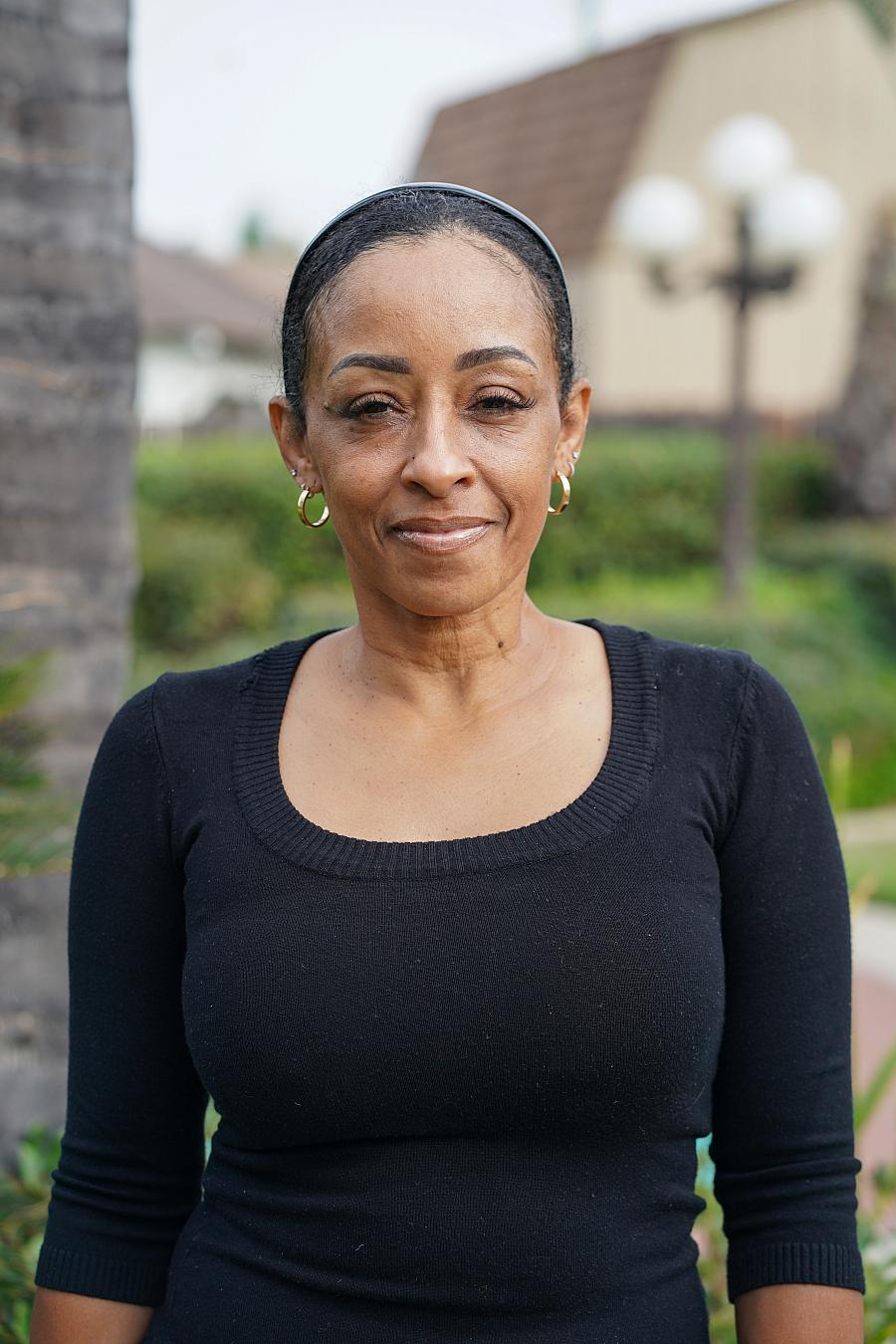
Crystal Foster, 52, poses for a portrait in her home in Corona, California, on October 16, 2024. When Crystal was 25 years old she gave birth to her son, Tyler Foster, in a traumatic pregnancy.“I've come to terms with it, but it took a really long, long, long time to be a young woman, 35 years old, and just be like, ‘Okay, what does my life look like? Like I'm sitting looking out the window, like, what does my life look like?’
(Aryana Noroozi for Black Voice News/ CatchLight Local)
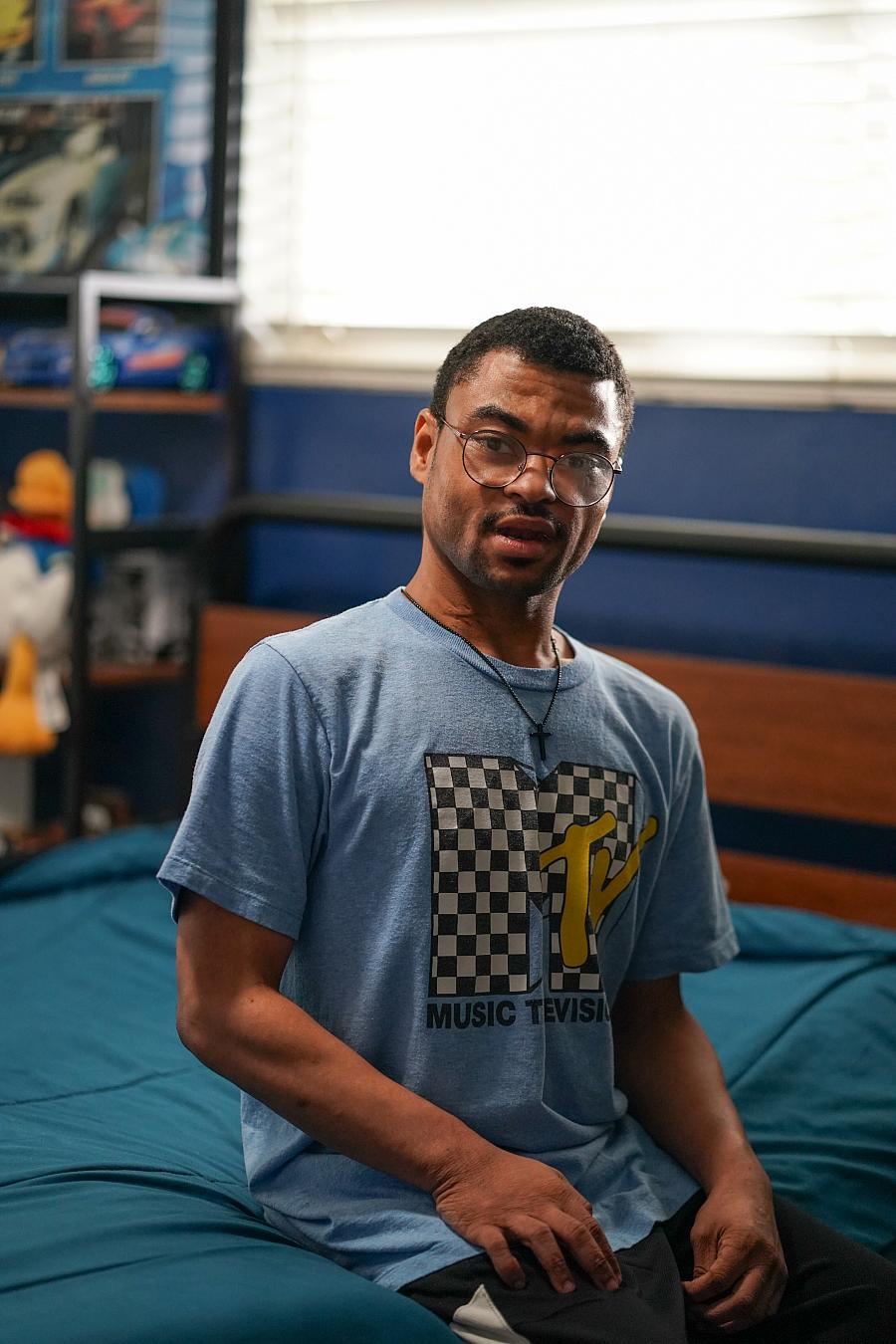
Tyler Foster, 28, poses for a portrait in his bedroom in Corona, California on October 16, 2024. Tyler enjoys going to his adult day program, playing on his ipad, eating snacks and going to the movies. “
(Aryana Noroozi for Black Voice News/ CatchLight Local)
Another study examined how parenting adults with developmental disabilities affects parental well-being into old age. The study found that parents of adults with disabilities follow a distinct pattern in which they often exhibit typical functioning in their mid 50’s, but by their mid-60’s, their overall health and well-being begins to decline. Those who live with their adult child with disabilities face even greater challenges, showing sharper increases in depressive symptoms compared to parents whose children with disabilities live independently.
In the Inland Empire many resources exist for those who need care such as the Inland Regional Center, which provides services to individuals with developmental disabilities and their families, and to diagnosis-specific organizations such as Autism Speaks.
Carmen Estrada, executive director of the Inland Caregiver Resource Center (ICRC), explained that ICRC focuses on the caregiver rather than the person needing care. Estrada explained that ICRC offers parent caregivers services including ongoing guidance, respite, counseling, care planning, education, and emotional support.
Estrada, 45, a parent caregiver herself, and a single mother, to her 19-year-old son who has autism and cerebral palsy, said that resources are lacking for parent caregivers because — unlike a caregiver of a spouse, someone with Alzheimer's, or illnesses with a shorter life span, “we are caring for our children for a much longer time,” Estrada said. “In my case, my son is now 19, and because of his diagnosis I know I will be caring for him until I can no longer do so.”
“I would say the various transitions from childhood to adulthood and beyond are challenging,” Estrada shared. For Estrada, resources appear to become scarce as both she and her son age.
Similarly, as Crystal and Tyler age, his care is reliant on Crystal’s own capacity. With Crystal’s own mother getting older and now unable to drive, she is unable to provide as much support in caring for Tyler as she did at one time. Crystal’s husband and brother work full time, and her oldest son moved to Washington, so Crystal shoulders the bulk of Tyler’s care.
“My family – like any normal people – are living their lives,” Crystal said. Crystal finds herself unable to set goals, make plans, or last minute decisions. ”Sometimes when I say that, it's hard for me, because I feel like I sound like I'm being selfish,” she said.
Caregiving full time for almost thirty years has shifted Crystal’s views on aging. When it comes to her own aging, Crystal says she hasn’t given it much thought; her focus is Tyler’s care and wellbeing. After overcoming serious medical conditions that consumed the first decade of Tyler’s life, Crystal’s only concern as he ages is that his health continues to improve.
Crystal said she finds comfort in the fact that Tyler has both an older and younger brother, who she knows will care for him after she and her husband are no longer able to.
“If God blesses me to live to an older age and Tyler's older, then we just grow old together,” Crystal said. However, Crystal is prepared to have a discussion with her other sons about the reality that Tyler will always need a caregiver.
As Crystal has grown older, she recalled overcoming one of the things she used to avoid and fear — people asking her what she does for a living.
Crystal hated meeting new people, knowing the first question they would ask about was her experience caring for a special needs child full time.
“When you're a full-time caregiver of a kid with special needs, it's hard for people to really grasp that,” Crystal said.
Now, Crystal looks forward to the future and chooses to be present, content and happy.
Jermaine and Jayden Moore
Similar to Crystal, Jermaine Moore has been a caregiver to his son, Jayden Moore, since he was born. Jayden, who loves playing and watching sports and just like his father, is an avid Raiders fan, has autism. Jermaine said being Jayden’s father and caregiver has made him selfless.
“Even when you thought you were being selfless with your kids, being selfless all the time, but you can be even more selfless, and you can obtain and you can achieve even more than you thought, even more than what's comfortable,” Jermaine explained.
When it comes to his own aging, Jermaine described setting the table for Jayden as a motivating factor for being more resilient than he imagined.
“You think about what's going to happen to him if I die. If I pass away, who's going to be there to take care of him?” Jermaine asked rhetorically.
“It kind of changed the way that I was raising my other kids, because at some point [they] might be responsible for [Jayden]. And also in the future, it’ll change the way I look at life insurance. It changed the way that I was saving because I want to make sure that the financial piece is going to be there for him,” Jermaine explained.
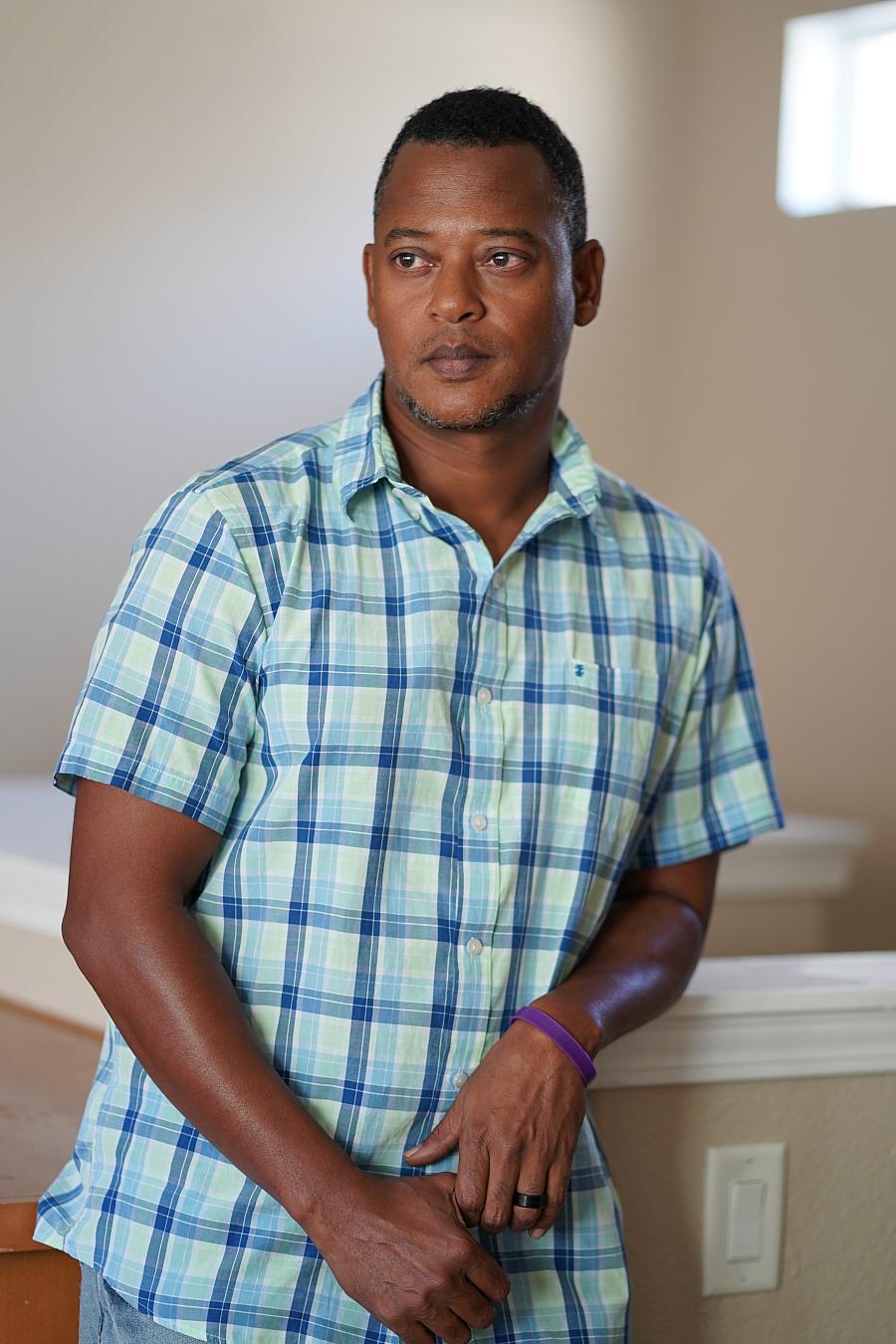
Jermaine Moore, 45, poses for a portrait in his home in Riverside, California, on October 9, 2024. Moore is caring for his son, Jayden Moore, 8, who has autism. When it comes to his own aging, Jermaine describes setting the table for Jayden as a motivating factor for being even more resilient than he ever imagined possible.
(Aryana Noroozi for Black Voice News/ CatchLight Local)
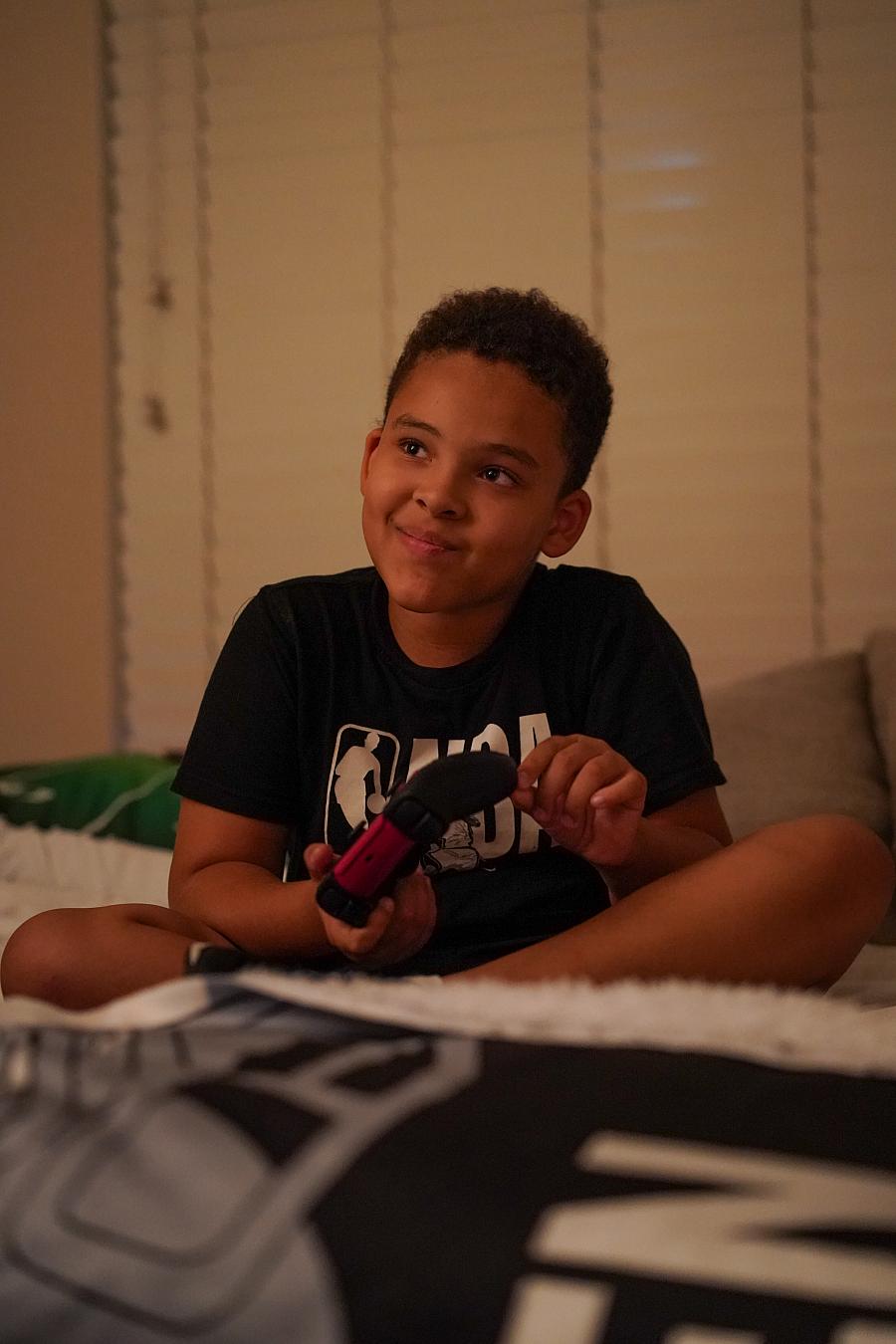
Jayden Moore, 8, poses for a portrait in his bedroom in Riverside, California, on October 9, 2024. Jayden has autism and his father, Jermaine Moore, is his caregiver. Jayden loves playing and watching sports. Like his father, he is an avid Raiders fan.
(Aryana Noroozi for Black Voice News/ CatchLight Local)
For Moore, a football lover and high school coach, one of the greatest joys of being a father and caregiver is watching Jayden play sports after Moore thought he would be unable to do so.
“It’s the little things that feel so big,” he said as he wiped tears from his eyes.
For Jermaine, one of the most difficult parts of caregiving is others not understanding Jayden’s needs – particularly, his own family in one instance.
“His mom didn't believe in it, and so it was tough because she just thought he was going to break out of it. We tried to treat him normal, instead of looking for services and resources for him. So you feel alone and then the divorce happens,” he said. “You think that's going to bring you together forever, because we got to deal with this forever, and that doesn't always happen.”
When Jermaine found a community among other caregivers through the United Domestic Workers Union (UDW), he realized that he wasn’t alone in this struggle. This same community has helped him prepare for the future as he grows older.
“There's just a lot of other people who are just like you in the same situation,” Jermaine said. The community he found at UDW and the Inland Regional Center helped him navigate the challenges of caregiving as a parent. When it comes to life insurance and financial planning, Jermaine shared that his own experience of working in insurance made the process easier to navigate.
Without his experience, it “would absolutely be a lot harder,” he maintained. Jermaine worked to compile a list of insurance options that are more lenient with medical issues, in an effort to “identify products that are more friendly towards our community.”
Jermaine’s greatest concern is passing away. Jermaine is not alone when it comes to worrying about dying. A 2012 study indicated that aging parents who live with their children with intellectual disabilities may experience increased anxiety about their child’s future living situation when the parents are no longer able to provide daily care.
As Jayden ages, Jermaine doesn’t have many concerns besides if he will be able to physically support Jayden.
“[He] did actually make me get into better shape.” Jermaine said. “A couple of years ago, I was thinking about what my future might look like as he gets bigger and [how] he might need my help physically.”
As Jermaine ages, he looks forward to continuing his work with the community of caregivers. This month he is hosting a holiday event for special needs children and their caregivers. Each child and their sibling[s] will receive a gift.
Jermaine said he looks forward to bringing this event to this specific community because it will be a special, customized gathering just for special needs children, their families and caregivers.
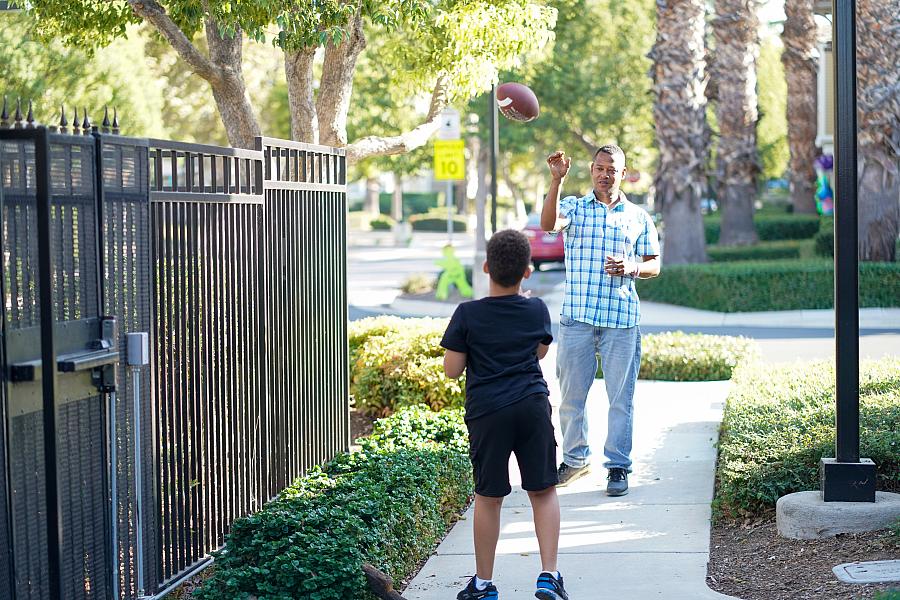
Father and son, Jermaine Moore, 45, and Jayden Moore, 8, throw a football outside their home in Riverside, California, on October 9, 2024. When recalling the most difficult part about this experience, Jermaine describes others not understanding – particularly, at one time, his own family. After finding a community of caregiver parents, he found that he wasn’t alone.
(Aryana Noroozi for Black Voice News/ CatchLight Local)

“This job is a hard job,” said Yvette Elam, assistant director of International Operations Southern Region, at UDW. “The work they do is God’s work – they take care of the most vulnerable people on this earth.”
Elam maintained that there needs to be a fight at the federal level for Congress to allow parent caregivers to be recognized as workers and receive retirement and social insurance benefits.
“Everyday that’s what we’re fighting for – teaching our providers to advocate for their clients and us advocating for them.”
This Black Voice News project is supported by the USC Annenberg Center for Health Journalism, and is part of “Healing California,” a yearlong reporting Ethnic Media Collaborative venture with print, online and broadcast outlets across California.
